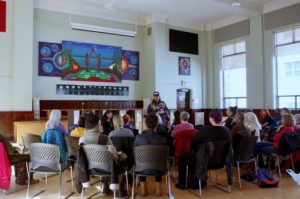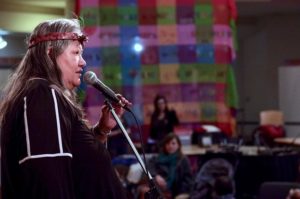‘We need to share our stories…they still don’t know enough’ says Curve Lake First Nation storyteller

By Rick Garrick
TORONTO—A story by the late Elder Art Solomon was one of the stories shared by Curve Lake First Nation storyteller Mike Ormsby during the 40th Annual Toronto Storytelling Festival.
“I shared a bit of my family’s story, without trying to make it a story about my family but it ended up being that — it’s very similar to a lot of our people, and that is why I shared that story because we all have that commonality,” Ormsby says. “And then, I shared a story that I had been taught by Art Solomon, one of our Elders who passed away 20-some years ago. Art was my teacher and gave me the name that I carry, so I honour him usually when I do these sort of [gatherings].”
Ormsby was one of five Indigenous storytellers who shared stories at the Celebrating Stories session on March 23 at the Native Canadian Centre. About 70 storytellers and groups were featured during the festival, which ran from March 2-24 at venues across the city.
“I think we need to share our stories,” Ormsby says. “Even in this day and age, with all of the so-called things that people supposedly know about us, they still don’t know enough.”
Ormsby says he recently was working with some Grade 7 and 8 students at a school who didn’t know much about the Truth and Reconciliation Commission.
“I was astonished,” Ormsby says. “They’d heard about it but they didn’t really know what it was. I guess it’s our responsibility to do whatever we can to tell what we need to tell. But we can’t share everything — I’m very cautious on that.”
Jenny Blackbird, a Nehiyaw/Finnish storyteller from Alberta who grew up and lives in Toronto, participated as a panelist along with Ron Evans, a Métis/Chippewa-Cree storyteller from the prairies, during the International Storytalk: Who Can Tell? session on March 22 at A Different Booklist Cultural Centre.
“Today we spoke about stories and who has the right to tell stories in the way that stories are passed on and given permission,” Blackbird says. “So I think it is very important that a lot of us listen, in the Indigenous community and non-Indigenous people, we listen to what stories are public domain or which are personal or family stories that we shouldn’t be sharing.”
Evans says the important aspect for him about telling Indigenous stories is that they are not changed by the storyteller. But he also noted that some stories can only be told by certain people.
“Some of the stories come out of the Midewiwin [Society],” Evans says. “And no one but a Midewiwin person should tell them, even in our own culture.”

Sharon Shorty, a Tlingit, Northern Tutchone and Norwegian storyteller from the Yukon, shared stories about her character Gramma Susie and some of her own stories during the festival, including at the TD StoryJam Family Storytelling Day session on March 24 at the Toronto Reference Library.
“Altogether I’ve done nine presentations this week — it’s an intensive schedule,” Shorty says. “One lady came to me and said she was really impacted by one of my stories and is still thinking about it because it is a really sad story.”
Shorty began telling stories about 28 years ago.
“My grandmother told me I should tell stories, so you don’t say no to your grandma,” Shorty says. “This is my first time at the Toronto Storytelling Festival — it’s been really good. I’ve had a lot of repeat audience members, so I take that as an encouraging sign.”


